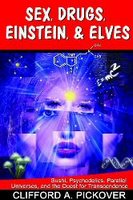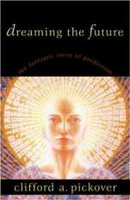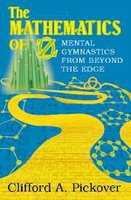Tuesday, January 24, 2006
The Implications of Frozen Brains on the Afterlife

In the 1950s, hamster brains were partially frozen and revived by British researcher Audrey Smith. If hamster brains can function after being frozen, why can’t ours? In the 1960s, Japanese researcher Isamu Suda froze cat brains for a month and then thawed them. Some brain activity persisted. But what if there is an afterlife? If we can someday freeze a human brain and then revive the person in a 1000 years, did that person already experience the afterlife while his brain was lifeless? I discuss this and similar questions in Sex, Drugs, Einstein and Elves.
Comments:
<< Home
The idea seems to be that because the soul (or mind or "something")
supposedly undergoes a journey upon death, the NDE (near-death experience) represents the
beginning of that journey. I wish I could believe that, but I don't
think you can extrapolate from what happens in the dying brain,
possibly triggered by oxygen shortage or other stressors, to what
happens after death. The opposite seems more likely: NDEs may be
partly responsible for the idea that the soul undergoes a journey
upon death. (Didn't some NDEs occur even before the development of
modern resuscitation techniques?)
If I froze your brain indefinitely, you would never enter the afterlife? Well, that's an altogether easier question. With little constraint on
what may or may not be, a wide range of speculations may be indulged
in.
Maybe the soul of someone in suspended animation goes into limbo?
Or maybe not, as the Catholic Church has recently decided to phase
out limbo. I wonder whether Augustine or Thomas Aquinas ever
considered the question?
Nick
supposedly undergoes a journey upon death, the NDE (near-death experience) represents the
beginning of that journey. I wish I could believe that, but I don't
think you can extrapolate from what happens in the dying brain,
possibly triggered by oxygen shortage or other stressors, to what
happens after death. The opposite seems more likely: NDEs may be
partly responsible for the idea that the soul undergoes a journey
upon death. (Didn't some NDEs occur even before the development of
modern resuscitation techniques?)
If I froze your brain indefinitely, you would never enter the afterlife? Well, that's an altogether easier question. With little constraint on
what may or may not be, a wide range of speculations may be indulged
in.
Maybe the soul of someone in suspended animation goes into limbo?
Or maybe not, as the Catholic Church has recently decided to phase
out limbo. I wonder whether Augustine or Thomas Aquinas ever
considered the question?
Nick
Those of us who believe in an afterlife assume that there is a mechanism that couples our nonmaterial essence (soul) to our meat-based bodies. At true death, they are uncoupled and the soul goes... where it is meant to go. There are a range of grey areas where people describe "near death" experiences and then come back from "the brink". My minister refers to death as "pushing through a membrane", an allusion I like (I assume the birth imagery is deliberate). If we believe that the hours of our life are numbered and that we die precisely when we are "meant" to die, then I have no difficulty at all with cryogenic suspension as a haitus in consciousness just like sleep, coma or anaethesia are "gaps" in our conscious experience. I don't beleive we would experience anything in such a suspended state, however long it may be. The thing to remember is that the afterlife will have no regard for linear time in the way we understand it. When we pass from time into eternity, one moment is as infinitely close as any other to "go over", comparitively speaking.
The brain is just an instrument.
Consciousness is an attribute of the soul, not of the brain.
Intelligence, love, compassion, etc. are inherent in and pervade all creation. Brains are filters that tunes into various levels of such aspects of creation.
"You" (soul) are not = your brain.
Consciousness is an attribute of the soul, not of the brain.
Intelligence, love, compassion, etc. are inherent in and pervade all creation. Brains are filters that tunes into various levels of such aspects of creation.
"You" (soul) are not = your brain.
developments like this merely make us redefine the point at which 'true death' occurs. It used to be when the heart stops - developments in medical science have shifted the goalposts so now death is said to occur when the brain stops - and now, if this freezing idea works, then it'll be pushed back even further - as will the point at which the putative afterlife begins.
If there's some interface between soul and brain, it seems like the brain would need to be active for it to work. If the brain shuts down, the soul goes free.
If this isn't the case, then the criterion for final seperation would seem to be whether the brain would reactivate *in the future*, which seems to defy causality and cast doubt on the notion of free will.
Another option would be that the interface lies somewhere in the hardware of the brain and remains active even if the brain is not. It seems unlikely, though, that there's a physical organ that tethers the incorporeal spirit.
I think, however, that the "hardware" premise is necessary if you believe that an inactive brain tethers the soul indefinitely as long as it remains intact.
Other possibilities include:
1. The soul *does* leave and actually comes back once the brain reactivates. If the brain is "just an instrument," I don't see why this couldn't happen.
2. A new soul is born (just as in an infant) when the brain activates, and subsumes the old one's role. The old soul remains in the afterlife or in a new body.
3. The brain reactivates, but has no soul. Would anyone be able to tell the difference?
4. Whatever spiritual entity happens to be nearby inhabits the empty brain.
5. Of course, it's possible that there's no such thing as souls or spirits.
If this isn't the case, then the criterion for final seperation would seem to be whether the brain would reactivate *in the future*, which seems to defy causality and cast doubt on the notion of free will.
Another option would be that the interface lies somewhere in the hardware of the brain and remains active even if the brain is not. It seems unlikely, though, that there's a physical organ that tethers the incorporeal spirit.
I think, however, that the "hardware" premise is necessary if you believe that an inactive brain tethers the soul indefinitely as long as it remains intact.
Other possibilities include:
1. The soul *does* leave and actually comes back once the brain reactivates. If the brain is "just an instrument," I don't see why this couldn't happen.
2. A new soul is born (just as in an infant) when the brain activates, and subsumes the old one's role. The old soul remains in the afterlife or in a new body.
3. The brain reactivates, but has no soul. Would anyone be able to tell the difference?
4. Whatever spiritual entity happens to be nearby inhabits the empty brain.
5. Of course, it's possible that there's no such thing as souls or spirits.
Wow. js_vp, can I have some of what you're smoking? I won't do bad things, even if the voices tell me.
This is rather deep and thought provoking. I remember when I was younger I watched a show called "So Weird" and it involved something similar to this question. The guy in it was frozen in hopes that later on technology would be advanced enough to cure some sort of cancer he had. They cured it, but he seemed almost cold and empty...like he was missing something. In the end, an elderly magician that was dying was told to give the guy his hand and the magician's soul went into the man's body.
I do not know what to think about this development, but I will say that the post and the comments are very interesting.
I do not know what to think about this development, but I will say that the post and the comments are very interesting.
Eventually, a frozen human brain will be thawed. If normal brain functioning returns, its owner will have no memory of an afterlife. Those who believe in an afterlife will explain this away as the way the afterlife works--if you come back to life, you don't get to remember. Those who don't believe in an afterlife will have this experience to add to their pile of evidence. And the debate will be right back where it began. Yay.
Post a Comment
<< Home
 Godlorica
Godlorica



























